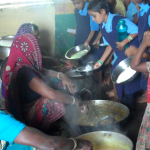Married for 26 years, Phoolkumari has been deprived of her share of the family property. The reason? She has six daughters. "My relatives told me you have no one to continue the family lineage. What will you do with property? Give it to your sons-in-law?" she says.
She works as a cook in a government school, which pays her thirty rupees a day.
“I can’t sleep at night. People mock me because I wasn't able to give birth to a son. They ask me to beg for a living’, she laments.
A study 2014 study on masculinity and son preference by the United Nations Population Fund and the International Centre for Research on Women conducted found that 81% women in India felt that it was important to have at least one son. Son preference is the primary reason for India's skewed sex ratio. Uttar Pradesh, the state Phoolkumari is from, has a sex ratio of 912 women per 1000 men and a female literacy rate of just over fifty-seven percent.
As Phoolkumari’s story shows, the ‘inability’ to have male children severely affects a woman’s status in her family and society. Abandoned by her mentally unstable husband ten years ago, the 46-year old, mother of 6 daughters fends for herself and her daughters and is at the receiving end of stigma and ridicule instead of support. This is also a story of lacunae in policy. While the government has enacted laws to ban gender-biased sex selection and sex determination and has rolled out schemes that provide monetary incentives to send daughters to school, nothing has been done to address the root cause: the patriarchal assumption that women are inferior to men.
Struggling single mothers like Phoolkumari have no social security and no safety net that complements their struggle to be financially independent and raise educated, able daughters. Government policy is blind to the needs of single women and mothers in rural India. Unless this changes, men will continue to be seen as the sole bread earners within the family unit thereby perpetuating a ‘need’ for and dependence on male ‘heirs’. The government’s policy to ensure girl children are valued needs to move away from coforming to existing stereotypes. The current scheme is named ‘Ladli-Laxmi Yojana’. Laxmi is the goddess of prosperity associated with the well being of the household. There need to be a valourisation of struggling working women like Phoolkumari who are the real heroes, the providers and earning members of their families.
This video is made by Community Correspondent Anil Kumar Saroj, Uttar Pradesh. This series documenting everyday patriarchy is supported by UNFPA
Community Correspondents come from marginalised communities in India and produce videos on unreported stories.
These stories are ’news by those who live it.’ They give the hyperlocal context to global human rights and development challenges. See more such videos at www.videovolunteers.org. Take action for a more just global media by sharing their videos and joining in their call for change.
Fixing India| Catching A Human Trafficker| Featuring Navita Devi|
Because of Navita's determination and bravery, a human trafficking agent is being the bars, and the girls have returned to their homes.This is how our CC’s are helping raise issues and finding solutions.
Self-Help groups unable to reach their potential
In Udaipur village of Harhua block of Varanasi district, the Mahalaxmi Self Help Group was formed 3 years ago, but they could not operate independently, because of the high handedness of the village head and the laxity of the Government officials.

